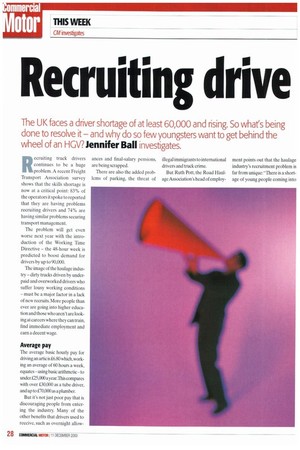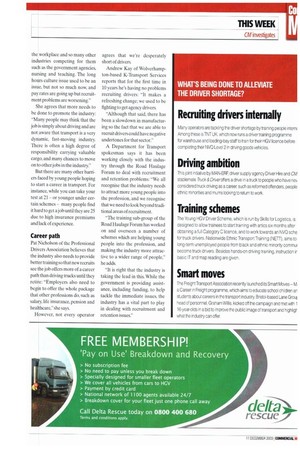Recruiting drive
Page 28

Page 29

If you've noticed an error in this article please click here to report it so we can fix it.
The UK faces a driver shortage of at least 60,000 and rising. So what's being done to resolve it — and why do so few youngsters want to get behind the wheel of an HGV? Jennifer Ball investigates.
Recruiting truck drivers continues to be a huge problem. A recent Freight Transport Association survey shows that the skills shortage is now at a critical point: 83% of the operators it spoke to reported that they are having problems recruiting drivers and 74% are having similar problems securing transport management.
The problem will get even worse next year with the introduction of the Working Time Directive the 48-hour week is predicted to boost demand for drivers by up to 90,000.
The image of the haulage industry dirty trucks driven by underpaid and overworked drivers who suffer lousy working conditions must be a major factor in a lack of new recruits. More people than ever are going into higher education and those who aren't are looking at careers where they can train, find immediate employment and eam a decent wage.
Average pay The average basic hourly pay for driving an artic is £6.80 which,working an average of 60 hours a week. equatesusing basic arithmetic-to under £25,000 a year.This compares with over £30,000 as a tube driver. and up to £70,000 as a plumber.
But it's not just poor pay that is discouraging people from entering the industry. Many of the other benefits that drivers used to receive, such as overnight allow ances and final-salary pensions, are being scrapped.
There are also the added problems of parking. the threat of illegal immigrants to international drivers and truck crime.
But Ruth Pott, the Road Haulage Association's head of employ ment points out that the haulage industry's recruitment problem is far from unique: "There is a shortage of young people coming into the workplace and so many other industries competing for them such as the government agencies, nursing and teaching. The long hours culture issue used to be an issue, but not so much now, and pay rates are going up but recruitment problems are worsening."
She agrees that more needs to be done to promote the industry: "Many people may think that the job is simply about driving and are not aware that transport is a very dynamic, fast-moving industry. There is often a high degree of responsibility carrying valuable cargo, and many chances to move on to otherjobs in the industry."
But there are many other barriers faced by young people hoping to start a career in transport. For instance, while you can take your test at 21 — or younger under certain schemes — many people find it hard to get a job until they are 25 due to high insurance premiums and lack of experience.
Career path
Pat Nicholson of the Professional Drivers Association believes that the industry also needs to provide better training so that new recruits see the job offers more of a career path than driving trucks until they retire: "Employers also need to begin to offer the whole package that other professions do, such as salary, life insurance, pension and healthcare," she says.
However, not every operator agrees that we're desperately short of drivers.
Andrew Kay of Wolverhampton-based K-Transport Services reports that for the first time in 10 years he's having no problems recruiting drivers: "It makes a refreshing change: we used to be fighting to get agency drivers.
"Although that said, there has been a slowdown in manufacturing so the fact that we are able to recruit drivers could have negative undertones for that sector."
A Department for Transport spokesman says it has been working closely with the industry through the Road Haulage Forum to deal with recruitment and retention problems: "We all recognise that the industry needs to attract more young people into the profession. and we recognise that we need to look beyond traditional areas of recruitment.
"The training sub-group of the Road Haulage Forum has worked on and overseen a number of schemes which are helping young people into the profession, and making the industry more attractive to a wider range of people." he adds.
"It is right that the industry is taking the lead in this. While the government is providing assistance, including funding. to help tackle the immediate issues, the industry has a vital part to play in dealing with recruitment and retention issues."


























































































































































































